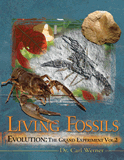Not-So-Ancient Algae
Tiny fossils of algae found at the edge of Loch Torridon in Scotland have been hailed as evidence that life evolved in freshwater and on land a billion years ago.
News Source
- Dailymail.co.uk: “One Billion-year-old Life Form Fossils Found on Edge of Scottish Loch”
Because the fossils are in rock believed to be a billion years old, the algae fossils are assigned the same age. Since previous findings have suggested that ancient land and freshwater environments hosted only bacteria, the discovery of “more complex” creatures here has suggested to evolutionists that evolution of life on land started earlier than previously thought. As Professor Brasier, one of the authors said, “These new fossils show that the move toward complex algal cells living in lakes on land had started over a billion years ago, much earlier than had been thought.”
The presumptions underlying these conclusions demand that the methods dating the Torridonian sequence rock be reliable. However, the fact that certain types of fossils—bacteria, algae, invertebrates, and vertebrates—are found grouped in certain ways does not demand an evolutionary timescale. To impose an evolutionary timescale on the fossil record is to impose an evolutionary bias demanding long periods of time and uniformitarian geology on the data. In addition, the arrangement of fossils in the fossil record does not prove that one life form evolved sequentially into another; it only shows that a number of life forms were suddenly buried together.
The sparser microfossils found in the lower Precambrian rocks are also easily explainable by the Creation-Flood model of earth history.
While the global Flood and post-Flood catastrophes help explain the rapid burial required to produce most of the fossil record—particularly the impressive fossil collection called the Cambrian explosion—the sparser microfossils found in the lower Precambrian rocks are also easily explainable by the Creation-Flood model of earth history.
Although the pre-Flood world was without catastrophic upheavals, there is no reason to believe that nothing at all was happening to shape the geology of the planet. The lowest Precambrian rock is regarded by many creation geologists as pre-Flood sediment. This pre-Flood sediment, while not at all conducive to large-scale fossilization, would naturally contain some organic geochemical evidence of bacteria and even some fossilized microorganisms, such as those found here.
Further Reading
- Radiometric Dating: Back to Basics
- Radiometric Dating: Problems with the Assumptions
- Radiometric Dating: Making Sense of the Patterns
For More Information: Get Answers
Remember, if you see a news story that might merit some attention, let us know about it! (Note: if the story originates from the Associated Press, FOX News, MSNBC, the New York Times, or another major national media outlet, we will most likely have already heard about it.) And thanks to all of our readers who have submitted great news tips to us. If you didn’t catch all the latest News to Know, why not take a look to see what you’ve missed?
(Please note that links will take you directly to the source. Answers in Genesis is not responsible for content on the websites to which we refer. For more information, please see our Privacy Policy.)
Recommended Resources

Answers in Genesis is an apologetics ministry, dedicated to helping Christians defend their faith and proclaim the good news of Jesus Christ.
- Customer Service 800.778.3390
- Available Monday–Friday | 9 AM–5 PM ET
- © 2026 Answers in Genesis






